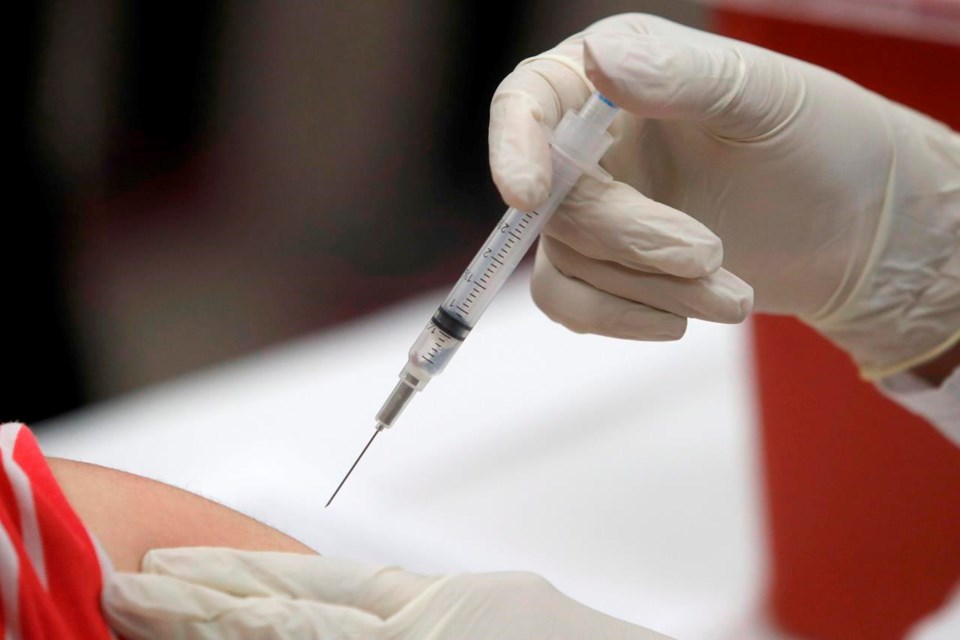OTTAWA ŌĆö The federal Liberal government has spent three years deliberating on an invitation to join a global body that designs vaccinations to protect the world's poorest from preventable diseases.
Documents reviewed by The 91įŁ┤┤ Press show South Korea has been encouraging Canada to join the International Vaccine Institute, an agency based in Seoul that the United Nations helped launch in 1997.
The agency conducts research on vaccines for diseases given less attention by pharmaceutical companies, and looks at how to tweak immunizations to make them work better in conditions such as rural parts of poor countries.┬Ā
Since the COVID-19 pandemic, the institute has been focused on helping developing countries gain the capacity to manufacture vaccines.
"The only way we tackle infectious diseases, which are global, is to have global partnerships," said Paul Hodgson, operations director with the University of Saskatchewan's Vaccine and Infectious Disease Organization, which has worked with the institute.
An internal briefing document obtained under access-to-information law advised Foreign Affairs Minister M├®lanie Joly that her South Korean counterpart, Park Jin, might bring up the institute in a meeting last September.┬Ā
Further documents provided by the institute show it ┬Āfirst invited Canada to join nearly 40 other countries as a member in a July 24, 2020 letter.
The letter asked Canada to consider making a financial contribution and suggested it could use its membership to help advocate for developing countries' manufacturing capacity.
Other documents the organization provided show the invitation sparked a series of meetings in South Korea and correspondence between the agency and 91įŁ┤┤ government officials in Ottawa and Seoul.
But Canada still hasn't announced a decision.┬Ā
Hodgson has worked with the institute on various projects over the course of 20 years, including improving vaccines for whooping cough and respiratory syncytial virus.
He said the agency plays a key role in containing the spread of deadly diseases by working on immunizations that don't have the scale or profit potential that private corporations require.
He was part of a delegation that attended the Seoul headquarters in October 2019 with Saskatchewan Premier Scott Moe to launch a scientific exchange program. That same month, the agency welcomed a delegation from the National Research Council, a branch of the federal government, to discuss possible collaboration on unspecified vaccines.
The institute's global-affairs manager Colin McCann said that in a January 2021 call with Global Affairs Canada's head of health partnerships, the institute had to clarify that it carries out research and development on new shots. Ottawa is typically used to funding global organizations that purchase existing vaccines.
"It had not previously joined or funded an 'upstream' organization like IVI, which presented a new challenge and opportunity for Global Affairs Canada," McCann said in an emailed statement.┬Ā
In its own response to questions, the department did not dispute McCann's recollections.┬Ā
In spring 2022, the institute made what it called a sales pitch to 91įŁ┤┤ officials, with a slideshow that stressed financial contributions are voluntary. Just five countries fund the institute, which gets them access to fellowships and scholarships.┬Ā
The slideshow shared by the institute cites everything from Canada's desire for deeper ties with the Indo-91įŁ┤┤ to its aid commitments targeted at women and girls. It points to the agency's work in trying to find a vaccine for Group A Strep, which it pointed out is prominent among First Nations in northwestern Ontario.
"Joining IVI would offer Canada numerous advantages in the global health landscape," institute spokeswoman Youngmi Cho said in a recent emailed statement.
"By participating, Canada can actively collaborate on addressing public health challenges, particularly in vaccines, while contributing its expertise and resources to enhance vaccine research, development, and distribution worldwide."
South Korea's embassy in Ottawa said it supports the organization's work and expanding its membership. It declined to share the details of discussions between Joly and Jin.┬Ā
McCann said Joly was slated to announced Canada was joining the agency during a visit to Seoul last October, "but the visit and announcement were postponed, on account of procedural delays associated with parliamentary review of IVIŌĆÖs treaty."
Ottawa says it might have an update to share by next summer, which would mark four years since the invitation.
"Global Affairs Canada expects to have news of CanadaŌĆÖs involvement with the IVI within the next 12 months," wrote spokeswoman Genevi├©ve Tremblay.┬Ā
She noted that signing the treaty would require a vote in Parliament, and that some of the steps involved are confidential as they involve federal cabinet business.┬Ā
At the height of the pandemic, Canada faced global scrutiny for being among the countries that bought the most COVID-19 vaccines per capita while being slow to provide unused doses to other countries.
Last month, a British Medical Journal article called Ottawa "one of the most prominent hoarders of the limited global COVID-19 vaccine supply."
It said Canada was among the few countries that adequately funded the vaccine-sharing initiative COVAX, but undermined the entire project by holding onto doses and doing little to help developing countries manufacture their own shots.
Hodgson argued Canada is an obvious candidate for the institute, which seeks to empower developing countries.┬Ā
91įŁ┤┤ researchers played a central role in inventing a vaccine for Ebola and in the fight against polio, decades ago, through research at the now-defunct Connaught Laboratories in Toronto.┬Ā
The Liberals' biomanufacturing and life sciences strategy calls for building on these skills and making Canada one of the top sources of vaccine innovation.
"We've punched disproportionately above our weight in vaccines in Canada, and I think we can continue to do so," Hodgson said. ┬Ā
"That can't happen in a in a bubble. The only way we make progress on these things is collaboration."
This report by The 91įŁ┤┤ Press was first published Aug. 6, 2023.
Dylan Robertson, The 91įŁ┤┤ Press



